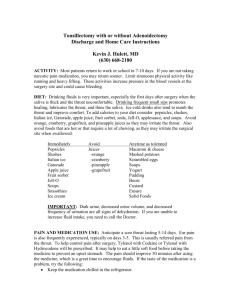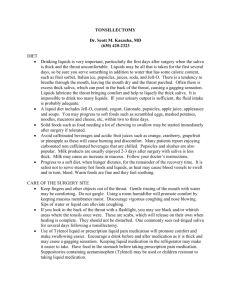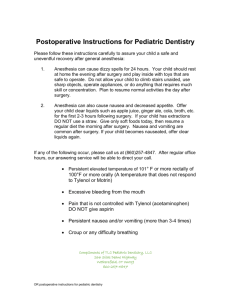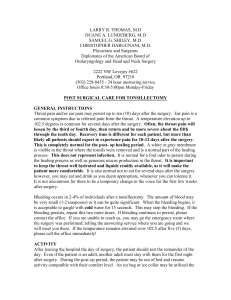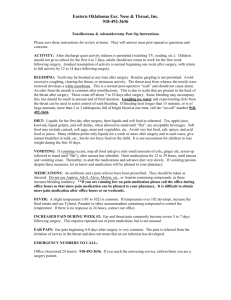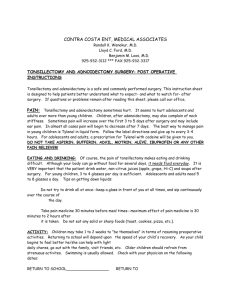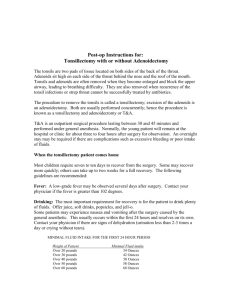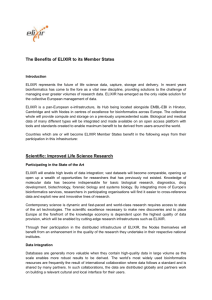TONSILLECTOMYSURGERY - Midwest ENT Consultants
advertisement
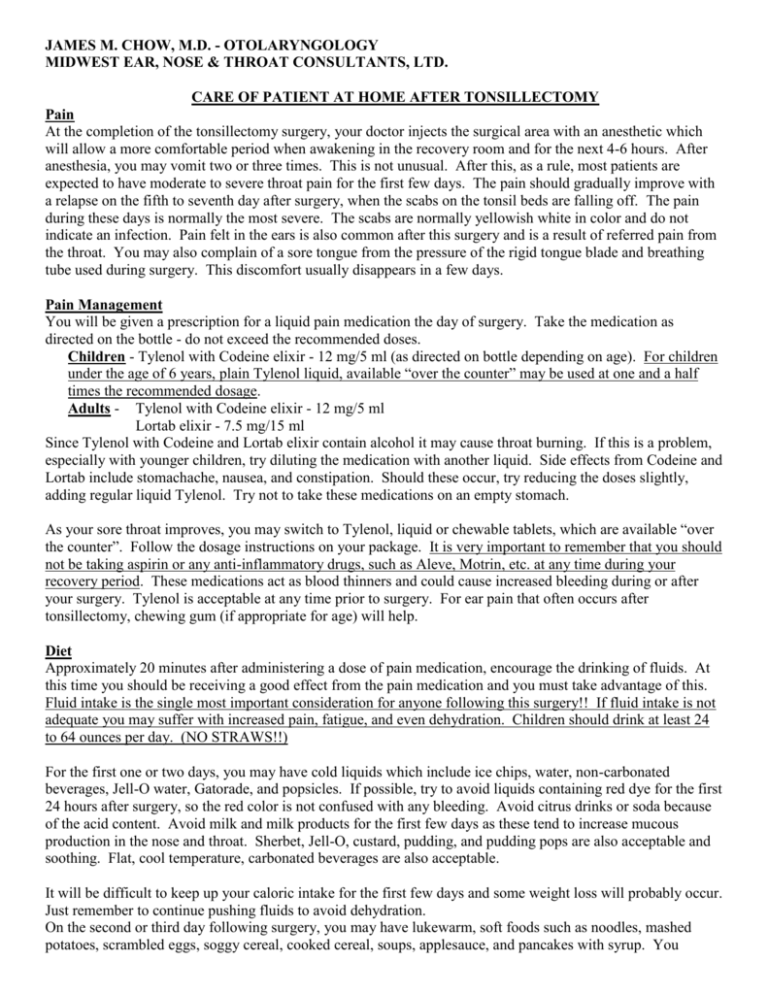
JAMES M. CHOW, M.D. - OTOLARYNGOLOGY MIDWEST EAR, NOSE & THROAT CONSULTANTS, LTD. CARE OF PATIENT AT HOME AFTER TONSILLECTOMY Pain At the completion of the tonsillectomy surgery, your doctor injects the surgical area with an anesthetic which will allow a more comfortable period when awakening in the recovery room and for the next 4-6 hours. After anesthesia, you may vomit two or three times. This is not unusual. After this, as a rule, most patients are expected to have moderate to severe throat pain for the first few days. The pain should gradually improve with a relapse on the fifth to seventh day after surgery, when the scabs on the tonsil beds are falling off. The pain during these days is normally the most severe. The scabs are normally yellowish white in color and do not indicate an infection. Pain felt in the ears is also common after this surgery and is a result of referred pain from the throat. You may also complain of a sore tongue from the pressure of the rigid tongue blade and breathing tube used during surgery. This discomfort usually disappears in a few days. Pain Management You will be given a prescription for a liquid pain medication the day of surgery. Take the medication as directed on the bottle - do not exceed the recommended doses. Children - Tylenol with Codeine elixir - 12 mg/5 ml (as directed on bottle depending on age). For children under the age of 6 years, plain Tylenol liquid, available “over the counter” may be used at one and a half times the recommended dosage. Adults - Tylenol with Codeine elixir - 12 mg/5 ml Lortab elixir - 7.5 mg/15 ml Since Tylenol with Codeine and Lortab elixir contain alcohol it may cause throat burning. If this is a problem, especially with younger children, try diluting the medication with another liquid. Side effects from Codeine and Lortab include stomachache, nausea, and constipation. Should these occur, try reducing the doses slightly, adding regular liquid Tylenol. Try not to take these medications on an empty stomach. As your sore throat improves, you may switch to Tylenol, liquid or chewable tablets, which are available “over the counter”. Follow the dosage instructions on your package. It is very important to remember that you should not be taking aspirin or any anti-inflammatory drugs, such as Aleve, Motrin, etc. at any time during your recovery period. These medications act as blood thinners and could cause increased bleeding during or after your surgery. Tylenol is acceptable at any time prior to surgery. For ear pain that often occurs after tonsillectomy, chewing gum (if appropriate for age) will help. Diet Approximately 20 minutes after administering a dose of pain medication, encourage the drinking of fluids. At this time you should be receiving a good effect from the pain medication and you must take advantage of this. Fluid intake is the single most important consideration for anyone following this surgery!! If fluid intake is not adequate you may suffer with increased pain, fatigue, and even dehydration. Children should drink at least 24 to 64 ounces per day. (NO STRAWS!!) For the first one or two days, you may have cold liquids which include ice chips, water, non-carbonated beverages, Jell-O water, Gatorade, and popsicles. If possible, try to avoid liquids containing red dye for the first 24 hours after surgery, so the red color is not confused with any bleeding. Avoid citrus drinks or soda because of the acid content. Avoid milk and milk products for the first few days as these tend to increase mucous production in the nose and throat. Sherbet, Jell-O, custard, pudding, and pudding pops are also acceptable and soothing. Flat, cool temperature, carbonated beverages are also acceptable. It will be difficult to keep up your caloric intake for the first few days and some weight loss will probably occur. Just remember to continue pushing fluids to avoid dehydration. On the second or third day following surgery, you may have lukewarm, soft foods such as noodles, mashed potatoes, scrambled eggs, soggy cereal, cooked cereal, soups, applesauce, and pancakes with syrup. You MUST AVOID any crusts, and all hard, crunchy foods such as chips, bacon, popcorn, and nuts. No hot liquids or spicy foods until after your second week post-operative appointment at the office. As a general rule, do not give your child anything which is too hot or too cold. You should be back to a normal diet at the end of two weeks. After all meals drink a full glass of water to loosen any food particles which might stick to the raw surgical area. Bad breath may be noticeable. Gentle tooth brushing is allowed. Bleeding Blood stained mucus in the mouth and throat is normal for the first 2 to 3 days. It is not uncommon to actually vomit some blood which has been swallowed. Harsh coughing and throat clearing should be avoided. It is relatively uncommon to have any appreciable amount of bleedings after returning home, but when it does occur, the most common time period is from the fifth to the seventh day after surgery. Usually this amounts to spitting or coughing out several blood clots or a teaspoonful of bright red blood over a period of 20 to 30 minutes. This may occur from the nose as well as the mouth. If this occurs, have the patient rest quietly with no exertion. Drink cool liquids and apply an ice wrap to the neck. If bleeding is profuse at any time, or lasts more than 30 minutes, please call the office immediately. Activity Children should be very quiet on the first day at home, but up and about the house on the second day. No rough-housing or strenuous play for 2 full weeks after surgery. DO NOT RETURN TO SCHOOL OR WORK FOR AT LEAST EIGHT DAYS. Medication You will receive a prescription for antibiotics following surgery. Please take as directed. Tylenol may be taken for pain. Tylenol with codeine may be prescribed but be aware of stomach upset, nausea, vomiting, or headache from constant use. Do not take aspirin or any products containing ibuprofen type medications. Fever It is normal for the patient’s temperature to be elevated one degree. Call the doctor if your child’s temperature is 101°F or higher by mouth. If any elevation continues past 3 days, please call the office. Fever is most commonly caused by dehydration or lack of sufficient fluids. Speech It is common for the voice to sound hoarse or nasal following the surgery. This can last anywhere from a few days to a few months. Follow Up Please call the office for a follow-up appointment in 14 days. If your child should experience difficulty in breathing, bleeding that you feel is excessive, persistent nausea or vomiting, pain that is unusual, swelling, or fever, please contact the E.R. or Urgent Care Center which is closest to you. I understand the above instructions and accept responsibility for compliance. I have no further questions. ________________________________________ ____________________ Signature of Patient/Responsible Party and Relationship Date ________________________________________ ____________________ Signature of RN/MD Date
